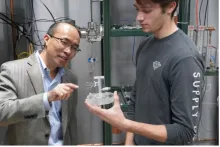MANE Program Educational Objectives
The Mechanical, Aeronautical, Aerospace, and Nuclear Engineering programs are each designed to prepare students for continued learning and successful careers in industry, government, academia, and consulting. While certain objectives of an undergraduate education in engineering are common to all programs, there are subtle but important differences that require some subset of objectives specific to ensuring that all graduates have specialized technical knowledge in their chosen field.
Graduates of the programs within Mechanical, Aerospace, Aeronautical, Aerospace, and Nuclear Engineering will apply their engineering knowledge, critical thinking, and problem-solving skills and be expected to:
- Engage in professional practice or enroll in high-quality graduate programs.
- Become leaders in engineering, science, academia, business, and public service.
- Continue their intellectual development through participation in continuing education, professional development, and/or community service.
Students who successfully complete any of these programs will be able to demonstrate:
- an ability to identify, formulate, and solve complex engineering problems by applying principles of engineering, science, and mathematics.
- an ability to apply engineering design to produce solutions that meet specified needs with consideration of public health, safety, and welfare, as well as global, cultural, social, environmental, and economic factors.
- an ability to communicate effectively with a range of audiences.
- an ability to recognize ethical and professional responsibilities in engineering situations and make informed judgments, which must consider the impact of engineering solutions in global, economic, environmental, and societal contexts.
- an ability to function effectively on a team whose members together provide leadership, create a collaborative environment, establish goals, plan tasks, and meet objectives.
- an ability to develop and conduct appropriate experimentation, analyze and interpret data, and use engineering judgment to draw conclusions.
- an ability to acquire and apply new knowledge as needed, using appropriate learning strategies.




